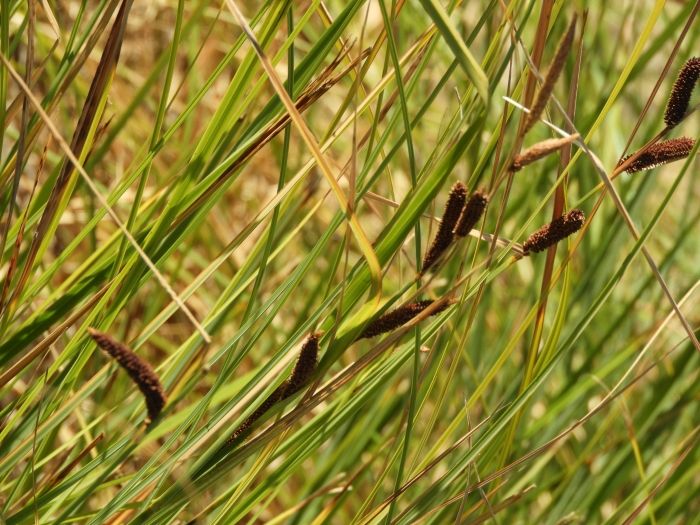Santa Barbara Sedge
(Carex barbarae)
Santa Barbara Sedge (Carex barbarae)
/
/

© Mary K. Hanson
CC BY 4.0
Image By:
© Mary K. Hanson
Recorded By:
Copyright:
CC BY 4.0
Copyright Notice:
Photo by: © Mary K. Hanson | License Type: CC BY 4.0 | License URL: http://creativecommons.org/licenses/by/4.0/ | Uploader: simpylmare55 | Publisher: iNaturalist |
























Estimated Native Range
Summary
Carex barbarae, commonly known as Santa Barbara sedge, is a perennial herbaceous plant native to riparian zones, wet meadows, and streambanks in California and Oregon. It can grow in both wet and seasonally wet habitats, often forming dense colonies. This sedge typically produces angled, hairless stems that can reach up to one meter in height. The foliage is characterized by tough, grass-like leaves with distinctive red-spotted or purple basal sheaths. During the flowering season, which occurs in late spring to early summer, Santa Barbara sedge develops an inflorescence consisting of erect and drooping spikes, up to 3 inches long. The fruits are enclosed in a sac-like structure called a perigynium, which is a key identifying feature of sedges.
Santa Barbara sedge is valued for its ability to stabilize soil and prevent erosion along waterways. It is also used in restoration projects and naturalistic landscaping, particularly in wetland and riparian plantings. In cultivation, it prefers full sun to part shade and requires consistently moist to wet soil conditions. While it is low maintenance, it can spread vigorously and may need to be managed to prevent unwanted naturalization. Historically, this sedge was utilized by Native American groups such as the Maidu and Pomo for basketry and as sewing fiber, highlighting its cultural significance.CC BY-SA 4.0
Santa Barbara sedge is valued for its ability to stabilize soil and prevent erosion along waterways. It is also used in restoration projects and naturalistic landscaping, particularly in wetland and riparian plantings. In cultivation, it prefers full sun to part shade and requires consistently moist to wet soil conditions. While it is low maintenance, it can spread vigorously and may need to be managed to prevent unwanted naturalization. Historically, this sedge was utilized by Native American groups such as the Maidu and Pomo for basketry and as sewing fiber, highlighting its cultural significance.CC BY-SA 4.0
Plant Description
- Plant Type: Grass
- Height: 1-3 feet
- Width: 1-3 feet
- Growth Rate: Moderate
- Flower Color: N/A
- Flowering Season: Summer
- Leaf Retention: Evergreen
Growth Requirements
- Sun: Part Shade
- Water: Medium
- Drainage: Fast, Medium, Slow
Common Uses
Bank Stabilization, Bird Garden, Deer Resistant, Erosion Control, Low Maintenance, Water Garden
Natural Habitat
Native to riparian zones, wet meadows, and streambanks in California and Oregon
Other Names
Common Names: Nettleleaf Sedge , White-Root Sedge , Basket Grass
Scientific Names: Carex barbarae , Carex laciniata , Carex lacunarum , Carex magnifica var. lacunarum
GBIF Accepted Name: